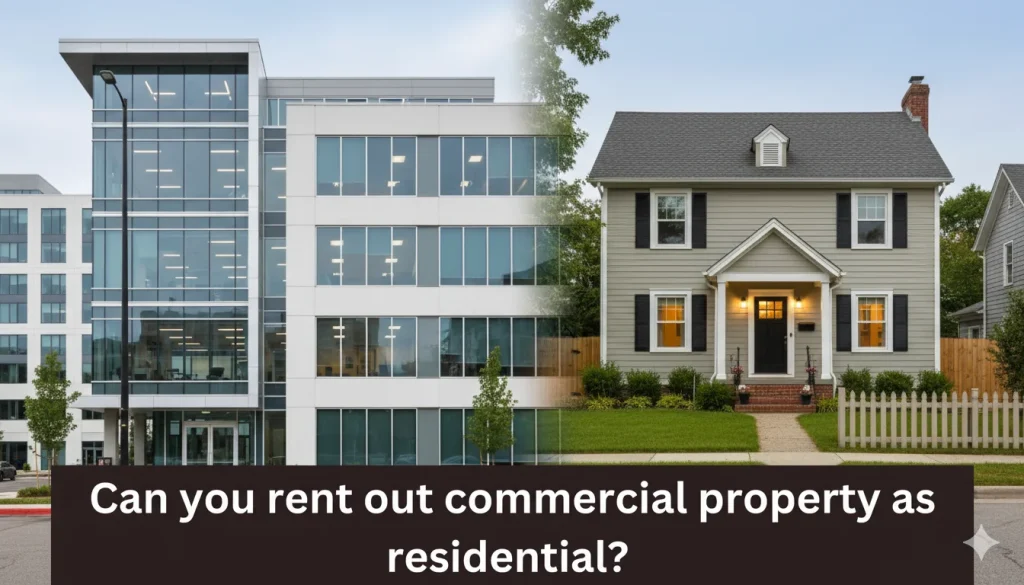If you’ve ever looked at a vacant office or retail space and thought, “Could someone actually live here?”, you’re not alone. Many real estate investors, including myself, have run into this exact situation. The idea of turning a commercial space into residential housing sounds smart, especially in tight markets or growing cities. But there’s a big difference between what seems doable and what’s legally allowed. I’ve worked with clients who learned this the hard way.
So let’s walk through this step by step, no fluff, just what you need to know if you’re thinking about renting out a commercial property as residential.
Table of Contents
ToggleCan You Rent Out Commercial Property as Residential?
In most cases, you can’t legally rent out a commercial property as residential unless it’s allowed under your local zoning laws and building codes. If the property isn’t zoned for residential use, you’ll likely need a rezoning or special use permit to make it legal.
Understanding Zoning Laws
Before you even think about converting or renting a commercial space for someone to live in, you’ve got to look at zoning laws. These laws determine how a property can legally be used, whether it’s for retail, office, industrial, or residential purposes.
Every piece of land is zoned for a specific use. If a building sits on commercially zoned land, it’s typically meant for business activities, not for people to live in. And while some zoning codes allow mixed-use (like retail on the ground floor and apartments above), pure commercial zoning usually prohibits full-time residential living. According to a presentation by the Kentucky Legislative Research Commission, Kentucky is a zoning enabling state and localities to adopt zoning under KRS Chapter 100.
How to check zoning:
- Get the property’s parcel number or address.
- Look up your local zoning map or use the city or county’s online GIS system.
- See what the zoning classification is (like C-1, C-2, M-1, etc.).
- Check the zoning ordinance or permitted uses for that classification.
If residential use isn’t listed under permitted or conditional uses, you’ll need to apply for a change; more on that in the next section.
Now, let me tell you about a situation I had with a client who bought a small commercial building, thinking he could rent it out to college students. It was near a university, had a decent layout, and even a few old showers from a gym setup. He figured, “Why not?” and listed it as a rental.
Big mistake.
A city inspector drove by, noticed people living there, and issued a zoning violation notice. My client ended up paying fines and had to go through a long rezoning process, including public meetings. He finally got it approved, but it delayed everything by 6 months and cost him way more than he expected. That situation taught both of us a key lesson: you always need to confirm zoning before turning commercial space into housing. No exceptions.
What Happens If the Zoning Doesn’t Allow Residential Use?
When the zoning on a commercial property doesn’t allow residential use, you’re not automatically out of options, but you are stepping into a more complicated process. The property isn’t considered legally suitable for someone to live in full-time, which means you’ll need to get official permission from your local planning department before making any moves. This usually comes down to two options: applying for rezoning or requesting a conditional use permit.
Rezoning the Property
Rezoning is exactly what it sounds like: asking the city to change the zoning designation of your property. If your building is currently zoned for commercial use (say, retail or office), and you want to rent it out as a residential unit, you’ll need to petition the planning commission to reclassify it to a residential or mixed-use zone.
This isn’t a fast process. It often involves submitting formal applications, creating site plans, paying fees, and attending public hearings where your neighbors can weigh in. City planners will consider whether your proposed use fits with the surrounding area. If you’re in a heavy business district, they might push back. But if your property is in a transitional neighborhood where mixed uses are becoming more common, your odds are better.
Even if the city agrees with your idea, they may attach conditions, like how many people can live there, parking requirements, or specific safety upgrades.
Conditional Use Permits
If you’re not looking to rezone the entire property, a conditional use permit might work. This is essentially a way to ask for a one-off exception to the zoning rules. You’re saying, “This is normally a commercial space, but I want to use it as residential under special conditions.”
Getting a conditional use permit still involves paperwork and sometimes public hearings, but it’s generally a quicker and less expensive route than rezoning. These permits are more common in areas where zoning codes are flexible, especially in older neighborhoods where buildings are being reused or repurposed.
Still, nothing is guaranteed. Local planning staff will look at whether your use fits the broader plan for the neighborhood. If the property lacks proper access, parking, or if the residential use seems out of place, the city may deny your request.
Why You Should Never Skip This Step
Trying to rent out commercial space as residential without going through the right approval process is risky. Not only could you be fined or face legal action, but your tenant could be forced to move out if the city finds out. Worse, if something goes wrong on the property, like a fire or safety issue, you could be held liable for using the space improperly.
That’s why taking the extra step to get a rezoning or use permit is essential. You’re not just protecting yourself legally; you’re ensuring the property meets the right safety and habitability standards.
I always recommend working closely with a local planning consultant or real estate attorney if you’re unfamiliar with the zoning laws in your area. They can guide you through the process and help you avoid costly mistakes. Even if it takes extra time upfront, getting it done the right way means you can rent out the space confidently, without worrying about surprise inspections or violations down the road.
Building Code Compliance: It’s Not Just Zoning
Once zoning allows residential use, or you’ve secured permission through rezoning or a special use permit, your next hurdle is the building code. This is where a lot of investors get caught off guard. Zoning might say “yes,” but building codes will determine how safe and livable the property actually is for someone to live in full-time.
Commercial buildings are built for business activities, not for people to sleep in overnight. That means they’re often missing key residential safety features and utility setups. Even if it looks like a livable space, it might not pass inspection without major updates.
Common Residential Code Requirements
Here are several key requirements that most residential units must meet. These may vary by location, but generally include:
- Emergency exits or egress: Each sleeping area needs a safe exit route in case of fire or emergency, usually a window or direct door.
- Smoke and carbon monoxide detectors: These need to be properly placed and hardwired or interconnected, depending on local codes.
- Plumbing setup: Residential codes require working bathrooms, kitchens, and proper water and waste lines.
- Ceiling height: Most codes require minimum ceiling heights in living areas and sleeping rooms.
- Fire safety features: Depending on the structure and number of units, you may need fire-rated walls, sprinkler systems, or multiple exits.
- Insulation and ventilation: The building must have the right heating, cooling, and airflow setup to be safe and comfortable year-round.
- Electrical standards: The wiring, outlets, and breakers must be safe for residential use and often require significant changes from commercial layouts.
Code vs. Comfort
Meeting building codes doesn’t just keep the city happy; it makes the space livable. I’ve walked into spaces where someone tried to DIY a conversion, and it felt more like camping indoors than actual housing. Tenants notice things like drafty windows, bad lighting, or poor ventilation quickly. And if something serious goes wrong, like an electrical issue or a plumbing failure, it can create legal liability that falls back on the landlord.
Here’s a basic side-by-side to show how commercial and residential needs usually differ:
| Feature | Commercial Space | Residential Standards |
| Emergency Egress | Often lacking | Required in bedrooms |
| Bathroom Facilities | Limited or shared | Full private bathroom |
| Insulation & HVAC | Maybe minimal | Must support year-round living |
| Fire Safety | Business-oriented | May need upgrades for residential use |
Before you let anyone move in, always check with a local building inspector. It’s one of the smartest moves you can make to protect both your investment and your tenant’s safety.
What About Short-Term Rentals?
Short-term rentals can seem like a great way to generate income from a commercial property, but they come with their own set of challenges. Many investors assume that if they can’t rent out a commercial space for long-term residential use, maybe they can get away with short-term stays like Airbnb or vacation rentals. But it’s not that simple.
Why Short-Term Rentals Might Be Considered Commercial Use
Even though people are sleeping in the space, short-term rentals are often classified as a commercial activity, not residential. That might sound strange, but from a legal and zoning standpoint, it’s true in many areas. Courts and city zoning departments often define short-term stays as “transient use,” which falls under hospitality or commercial zoning, not residential living.
This matters because if you’re using a commercial property for short-term rentals without the right permissions, you could still violate local zoning rules.
Local Rules Vary Widely

Every city, and sometimes even neighborhoods within cities, has different regulations for short-term rentals. Some places require:
- Business licenses for operating short-term stays
- Registration or permits specifically for short-term rental operators
- Zoning compliance to ensure the property is allowed to host guests
- Health and safety inspections before the property can be listed
Some cities even cap the number of days per year a property can be rented short-term, or require the owner to live on-site.
Don’t Assume It’s a Loophole
It’s a common mistake to think that renting out a commercial property for short stays is a legal workaround. But in many cases, short-term rentals face stricter rules than long-term residential rentals. That includes tax collection, guest tracking, parking enforcement, and sometimes neighborhood input.
And if the property isn’t safe or approved for overnight stays, and something goes wrong? You could be held liable, especially if you bypassed safety inspections or permits.
If you’re considering short-term rentals, always check your local laws first. Talk to a real estate attorney or planning official before listing your property. What seems like easy income can quickly turn into legal and financial headaches if you’re not careful.
Special Incentives: Downtown Conversion Programs
In some cities, especially those trying to breathe new life into their urban cores, local governments offer incentive programs to convert underused commercial properties into residential units. These are often known as downtown conversion programs or adaptive reuse initiatives. The goal is simple: take vacant or outdated commercial buildings, like old offices, warehouses, or retail spaces, and turn them into livable housing.
These programs are usually offered in city centers where there’s a push to increase foot traffic, boost housing supply, and reduce blight from empty buildings. If you’re investing in or already own a commercial space in an urban area, checking for such programs is a smart move. They might provide funding, tax credits, fee waivers, or even fast-tracked permits to encourage these types of conversions.
What These Programs Usually Support
Most conversion incentives focus on helping investors handle the biggest challenges of changing a building’s use, mainly zoning adjustments and building code upgrades. Cities might offer technical guidance or allow more flexible zoning rules in designated areas. In some cases, they’ll provide grants or property tax reductions if the new units meet affordability standards or add value to the community.
These programs are not just for huge developers. Even smaller property owners or new investors can benefit. Some local governments work directly with owners who want to turn a second floor above a shop into a livable unit or convert an entire office building into apartments. The key is aligning your project with the city’s larger development goals.
Why Investors Should Pay Attention
If you’re looking for a way to legally and efficiently convert a commercial property to residential, a local conversion program might be your best option. Not only do these programs reduce red tape, but they also create a framework where your project is more likely to get community and city support. It’s much easier to push a rezoning or renovation project through the system when it’s part of a broader plan the city already supports.
Before starting any conversion project, reach out to your city’s planning or economic development office and ask if they have any existing programs for adaptive reuse or commercial-to-residential conversions. Even a single meeting can save you months of frustration and open doors to funding and approvals you didn’t know were available.
Landlord-Tenant Rules for Residential Use
Once your property is zoned correctly and meets all building code standards, the final piece of the puzzle is landlord-tenant law. When you rent out a space as a residence, whether it was formerly commercial or not, you’re now subject to the legal responsibilities of a residential landlord. This includes providing a safe living environment, handling repairs promptly, and respecting tenant rights under the law.
Residential leases are legally different from commercial ones. You can’t use a commercial lease template and call it a day. Instead, your rental agreement needs to meet local and state laws governing residential housing. These laws usually cover rules on deposits, notice periods, eviction procedures, and the right to privacy. You’ll also be expected to maintain the property to livable standards, things like heating, running water, pest control, and working appliances.
Failing to follow these residential laws can lead to legal disputes, fines, or even court-ordered penalties. And if your tenant knows their rights (many do), they can push back hard if something’s not up to code or if you’re operating outside the law. Always consult a local attorney to make sure your lease and processes are aligned with residential rules before renting out the space.
Risks of Renting Residential Without Approvals
Trying to sidestep zoning or building rules is a gamble that rarely ends well. If you rent out a commercial property as residential without the proper legal steps, you’re opening the door to a long list of potential problems. Zoning enforcement teams can issue citations or fines. A tenant could report unsafe living conditions, which could trigger an inspection. And if someone gets hurt due to code violations, like missing fire exits or faulty wiring, you could be held legally and financially responsible.
Even insurance companies may refuse to cover damage or liability claims if they find out the property was being used in an unapproved way. And if your city finds out through an enforcement action or neighbor complaint, you might be forced to vacate the tenant immediately. That’s not only disruptive, it can lead to financial loss, lawsuits, and lasting reputational damage.
I’ve seen investors make this mistake, thinking they could “get away with it,” but the reality is, cities are cracking down harder than ever on illegal rentals. You’re far better off taking the time to go through the right channels. It protects your investment, your reputation, and your long-term ability to rent and grow your portfolio.
Final Thoughts
Renting out a commercial property as residential can be a smart move, but only if you do it the right way. Zoning, building codes, permits, and rental laws all play a role in whether your plan is legal and safe. Skipping steps might seem faster, but it usually ends up costing more in the long run.
Take your time, ask questions, and work with professionals who understand the rules. That’s how you turn a creative real estate idea into a solid, long-term investment.
Ready to Explore Commercial-to-Residential Opportunities?
If you’re thinking about converting or renting out commercial property in Louisville or anywhere in Kentucky, I’d be happy to help you navigate the process. I’ve worked with investors across the region and know exactly what steps you need to take to stay compliant and profitable.
Visit us to get expert guidance, market insights, and 1-on-1 support for your next real estate move. Let’s turn your property into the investment it was meant to be.

